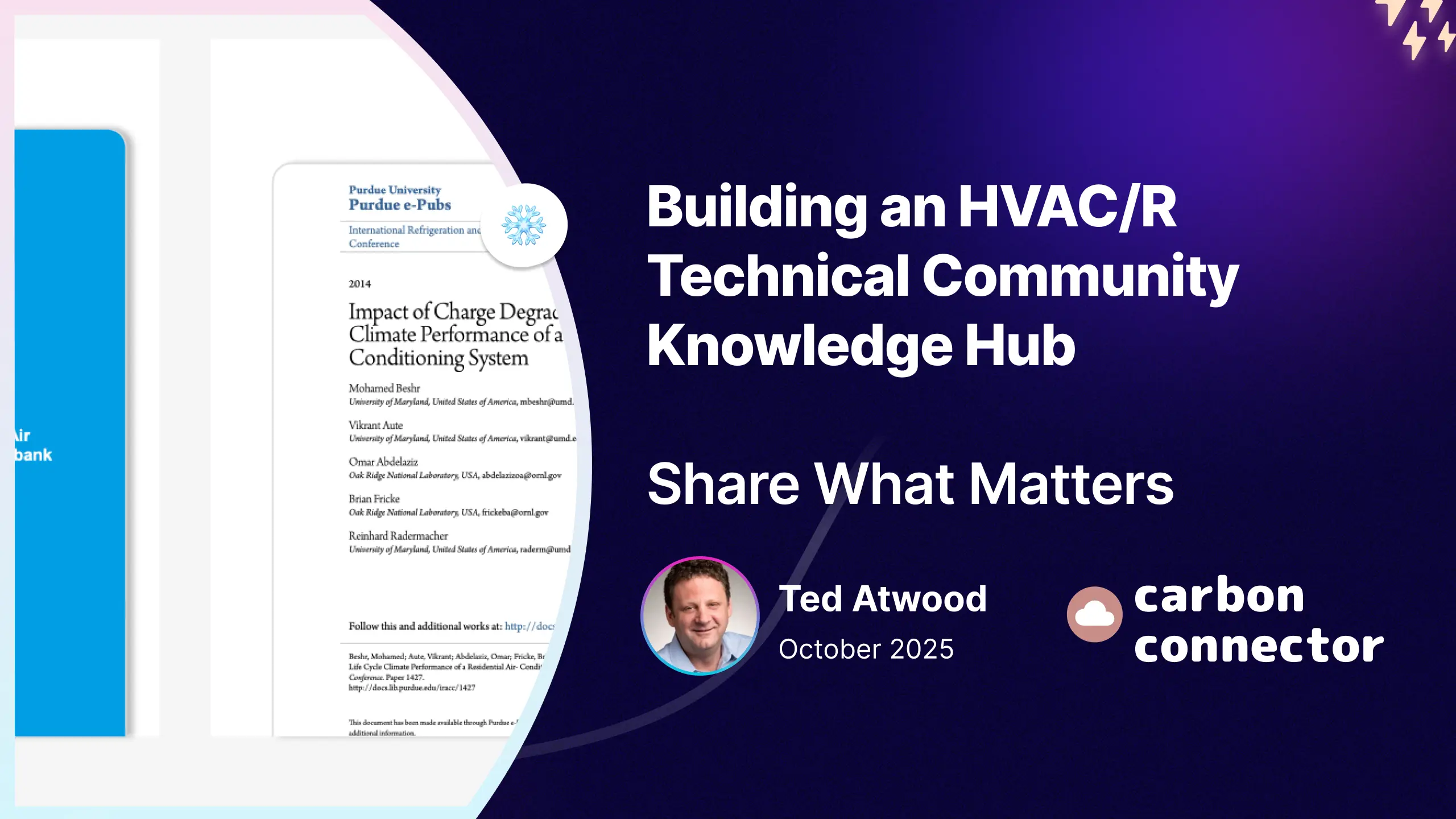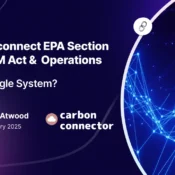
Building an HVAC R Technical Community Knowledge Hub: Share What Matters
Table of Contents
ToggleBuilding an HVAC/R technical, regulatory, and research-related sharing space
We believe that access to quality information shouldn’t be a privilege; it should be a foundation for collective growth.
That’s why we’re opening our doors and inviting you to be part of something bigger: a shared resource library built by practitioners, for practitioners.
→ Discover our HVAC/R Knowledge Hub
Where This Started
For more than a decade, I’ve had the same morning ritual: go online, pick a topic, and dive deep into research. Some days it’s energy efficiency metrics. Other days, it’s regulatory updates or emerging technologies. I gather studies, papers, reports, and data—sometimes using a resource once, sometimes referencing it fifty times over the years.
About ten years ago (maybe more), I downloaded a Navy study about equipment maintenance strategy. It introduced me to the “bathtub curve” concept and made a counterintuitive argument: operate equipment to failure, then replace it. The study was massive, dense, and sat mostly dormant in my files. I’d reference it occasionally, but it never seemed urgent.
Then, recently, while researching the future of data center maintenance and longevity (a term that might soon become an oxymoron given how rapidly this industry evolves) that old Navy study suddenly became invaluable. The bathtub curve framework offered insights into maintenance strategies that directly applied to questions about how we approach reliability in modern infrastructure.
That’s the thing about good research: you don’t always know when it will matter.
→ Discover our HVAC/R Knowledge Hub
Over the years, I’ve accumulated work from my time at the NSF, studies colleagues have shared with me, and reports I’ve stumbled across in rabbit holes of curiosity. Some of it gets used immediately. Some of it waits years for the right question to emerge.
All of it has value, not just for me, but potentially for anyone wrestling with similar challenges. Students and professionals alike can develop their ability to solve complex problems by accessing a wide range of resources, whether through formal training programs or self-guided research.
That’s why this repository exists. Because hoarding knowledge helps no one, and the insight you need might be sitting in someone else’s morning research pile.
🚨 Have a resource that’s made a difference in your work? We’d love to hear about it. Contact us to contribute to the repository.
What We’re Building
At carbonconnector.com/hvacr-resources, we’re hosting a growing collection of resources that matter to our industry and community. These aren’t materials locked behind paywalls or subscriptions. Everything here is freely accessible because we believe that learning, innovation, and progress happen best when knowledge flows freely.
Our repository spans the spectrum—from highly technical resources like measuring the Coefficient of Performance (COP) for data centers, to regulatory frameworks including EPA regulations and state-specific compliance guidelines. You’ll also find resources covering ice machines, various systems and different types of HVACR equipment, methods and procedures for installation and troubleshooting, protocols for building management, wiring diagrams, basic electricity and electrical principles, gas heating systems, cooling technologies, repairs, troubleshooting, pressure measurement, material selection, ductwork design, applications in different buildings, HVACR services, and thermodynamic processes. If it’s valuable to someone in our field, it belongs here.
→ Discover our HVAC/R Knowledge Hub
Why We’re Doing This
The best resources often come from unexpected places. Sometimes it’s a white paper that changes how you approach a project. Sometimes it’s a regulatory update that saves you from a costly mistake. Sometimes it’s a technical guide that finally explains something you’ve been struggling to understand.
We’re not claiming to be the original source of this knowledge—we’re curating it, organizing it, and making it accessible. Think of this as a community library where we’re all both contributors and beneficiaries. Sharing resources can enhance the learning experience for everyone and highlights the importance of collective knowledge in the HVAC/R field.
How You Can Contribute
Found something valuable? Share it with us. We’re looking for:
- Technical resources that deepen understanding
- Regulatory documents that keep us compliant
- Case studies that show real-world applications
- Research papers that push the industry forward
- Best practice guides that improve our work
- Tools and calculators that make our jobs easier
- Guides on techniques for refrigerant handling, identifying system components, and course materials for structured learning
If you’ve bookmarked it, referenced it, or learned from it, chances are someone else will too.
→ Discover our HVAC/R Knowledge Hub
This Is About Learning Together
No gatekeeping. No subscriptions. No hoarding knowledge that could help someone else solve a problem or do their job better.
We’re building this repository because we believe that when we share what we know, everyone benefits. The engineer in Seattle learns from the technician in Miami. The consultant references the same EPA guidelines as the in-house team. We all get better together. Sharing knowledge also helps reduce the risk of errors and inefficiencies in the HVAC/R industry.
What’s Coming Next
This is just the beginning. Soon, we’ll be adding a section dedicated to sharing links to blogs, articles, and other content—not because they serve a specific agenda, but simply to inform and engage. We also plan to highlight educational program resources in the future, including structured pathways and curricula relevant to HVAC/R technology. We’ll be posting much of this through Reddit to open up real dialogue about cause and effect, about what works and what doesn’t, about the questions that don’t have easy answers yet.
The goal is to create a space where everyone up and down the supply chain—from engineers and technicians to facility managers and policymakers—can engage with data democratically. Not in a political sense, but in the truest form of the word: where information is accessible to all, where expertise isn’t gatekept, and where good ideas can come from anywhere.
Because the best conversations happen when everyone has access to the same foundation of knowledge.
Join Us
Visit our HVAC/R Knowledge Hub to explore what’s already there, and reach out if you have resources to contribute. Let’s build something useful—together.
Because the best knowledge base isn’t built by one company or one expert. It’s built by a community that believes in sharing what matters.
🚨 Have a resource that’s made a difference in your work? We’d love to hear about it. Contact us to contribute to the repository.
FAQS
What is an HVAC R technical Knowledge Hub community?
An HVAC R technical community is a shared space where professionals, students, and practitioners exchange knowledge, resources, and best practices related to heating, ventilation, air conditioning, and refrigeration systems. It supports collaboration and continuous learning in this fast-growing field.
Why is building an HVAC R technical Knowledge Hub community important?
Building a reliable HVAC R technical community enhances the development and sharing of crucial information about HVACR systems, including installation, maintenance, troubleshooting, and regulatory compliance. This collective knowledge helps improve safety, system operation, and cost-effectiveness across commercial and residential environments.
What types of resources are typically shared in an HVAC R Knowledge Hub community?
Resources include technical guides on air conditioning systems, refrigeration, ventilation, heating systems, wiring diagrams, basic electricity, safety protocols, troubleshooting techniques, and updates on environmental regulations. Sharing these resources supports better understanding and practical skills.
How can joining an HVAC R technical community help with regulatory compliance? (Or performance or planning?)
An active community shares up-to-date information on EPA regulations, refrigerant handling protocols, and state-specific compliance requirements. This helps members stay informed about environmental standards and reduces the risk of costly violations.
What role does safety play in HVAC R training and practice?
Safety is crucial when working with HVACR systems due to electrical components, refrigerants, and moving parts. Proper training emphasizes safe installation and maintenance practices, protecting technicians and ensuring reliable system operation.
How can I contribute to an HVAC R technical Knowledge Hub community?
You can contribute by sharing valuable technical resources, case studies, regulatory updates, best practice guides, and tools related to HVACR systems. Collaboration strengthens the community and supports the ongoing development of knowledge and skills.
This hub is a comprehensive resource for HVAC/R programs, training, and technology, designed to support students and professionals in the fast-growing HVAC/R field. Our goal is to enhance the ability of students and practitioners to stay current with evolving technology and industry standards.



